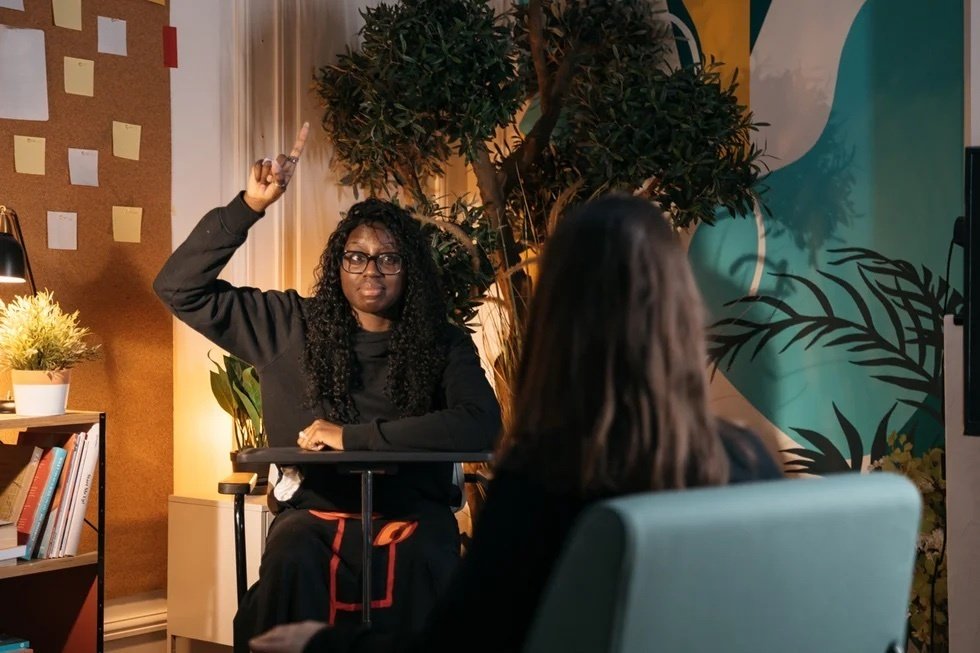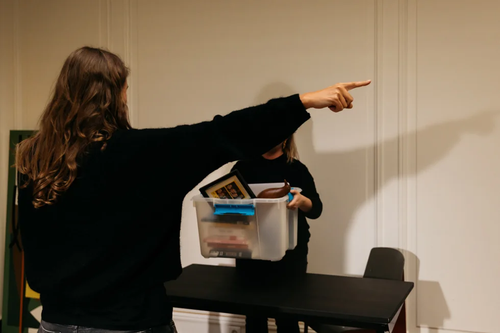Be ready for anything: How to handle unexpected interview questions
Mar 08, 2023
6 mins


Freelance writer and translator, ex-recruiter
Landing an interview is exciting. It’s the result of all the hard work you put into polishing your resume and writing an awesome cover letter! Now you need to focus on preparing to ace your interview. Aside from researching more about the company and diving deep into the role on offer, you need to think about how you’re going to answer unexpected interview questions—those tough interview questions that throw you a curveball. We all have that one friend who got asked what vegetable they’d like to be or who they’d invite to dinner and blanked it (unsurprisingly!).
If you want to avoid gaping and spluttering like a goldfish while your mind refuses to throw up any useful information in your interview, take some advice from Bobbiette Swanson, a Career Coach with over 30 years of experience and founder of Soar Career Services. Swanson shares her views on the motivation behind unexpected or difficult interview questions, and more importantly, exactly how you can handle them. Got an interview in the pipeline? Make these five simple steps part of your preparation and you’ll soon discover unexpected interview questions aren’t so hard to answer after all.
Why do employers ask unexpected interview questions?
According to Swanson, the hardest interview questions are designed to see how you think on your feet and react in an unsettling situation. These questions aren’t asked by chance. They have a clear purpose and it’s up to you to show the interviewer they can’t ruffle your feathers.
Even if you are unsettled, you need to show them you can keep your cool and do what’s needed in a tough situation. “The most difficult interview questions are the ones that make you uncomfortable,” she explains. This doesn’t always mean the off-the-wall “What’s your spirit animal?” type questions, but even seemingly simple things that you feel a bit icky responding to.
How to answer unexpected or difficult interview questions
If you want to ace your interview, then you need a plan of attack. With a little time and effort, these five steps will help you answer unexpected interview questions with ease.
Step 1: Practice the questions that make you feel uncomfortable
If you know something is a sore spot for you, work out how you’re going to answer it, ideally with a positive spin. Maybe the question that gets your goat is, “If you were ever let go from a role, why was that?” or “Why do you have a two-year career gap?” Swanson explains that answering hard interview questions is a very individual process.
To work out the sort of interview questions you’ll find hard to answer, she recommends looking up common questions online and seeing which ones give you butterflies (not the good kind). Those are the ones you need to work on. Don’t ignore them and hope they won’t be asked. Plan how you’re going to answer them honestly and positively. If you were let go because you lacked something for the role, what have you learned about yourself or what have you worked on since then?
Step 2: Have questions ready to help you understand unexpected interview questions
Refusing to answer an unexpected interview question will raise a red flag with any employer. They’ll get the impression you’re stubborn or difficult. Even if you think the question is inappropriate, there’s a way to handle it. Swanson suggests answering it with a question of your own, to understand where they’re coming from and what they’re hoping to get out of your answer. Try something like, “Well, that’s an interesting question. To understand better, if I may, can I ask why you’d like to know that?” The question may not be as inappropriate as you think.
Swanson shares a story from her own career. “I was interviewing for a recruiter role back in the early 90s and during the interview, they asked if I’d be willing to bring in my husband so they could meet him and ask him a couple of questions. It was definitely an unusual and potentially very inappropriate request. I politely asked them the reason for this and they explained that the role would involve a lot of ‘nos’ and taking a lot of knockbacks. They wanted to be sure I had a good support system in place.” This might be deemed inappropriate today, but there’s a lot to learn from Swanson’s response. She didn’t get offended or offend the employer and she discovered their intent was well-meaning, albeit perhaps misplaced.
Step 3: Work on how you share your weaknesses
Answering interview questions about your strengths and weaknesses is pretty much a given, but that doesn’t make it easy to do. You might not get the obvious, “Tell me about your weaknesses,” but there are many ways of asking this common interview question. For example, “We all have areas we can improve upon, what are yours?” or, “What do you feel you lacked most in your previous role?”
When it comes to your weaknesses, Swanson says, “There are two things to keep in mind: firstly, you don’t leave it sitting on the table and secondly, only ever share one.” She recommends you pick one weakness and share it, but elaborate on it as you do. Let’s take for example a fear of public speaking. If the role you are interviewing for requires it, even as a minor element and you simply say, “I’m terrified of public speaking,” you’ve just talked yourself out of a job. You can share that as your weakness but don’t stop there. What are you doing about it? What have you done about it? What do you plan to do about it? You might have reached out to your local Toastmasters’ group, signed up, and been working up to speaking in front of the group. Or, you might be working with a career coach or mentor to polish your public speaking skills. Another option is to talk about a past weakness and how you overcame it. The important thing is to demonstrate you’re taking action to improve.
Step 4: Match your strengths to the job description and prepare examples
Swanson recommends having a whole list of strengths and ideally relating them back to the job description. Be prepared to share items from your list whenever the opportunity arises in the interview. If they match the job description then there should be plenty of opportunity, whether the questions are obvious or more unusual. Swanson says, “I like to think of a job description as a recipe for the hiring manager’s favorite cake. If you have the ingredients for that cake you know it will turn out perfectly and they’ll love it. If you don’t have exactly the right ingredients, sometimes you can substitute one or two with something else and it can still turn out great.” In a recipe, you might substitute butter or oil that makes the cake moist with applesauce which will do the same job, but be healthier overall. Still a delicious cake right?
In a job description, they might be looking for experience with a certain database and you don’t have it. But you do have experience with other databases which will shorten your learning curve for the one they need. If your skills don’t match the job description perfectly be ready to highlight how they can or what advantages you bring to the table.
Step 5: Have some filler questions at hand so you can take a moment to think
Even with the best preparation in the world, you might not always have an answer on the tip of your tongue. Guess what? That’s ok. How do you handle it? Swanson recommends either of the following:
- Recap the question and make sure you’ve understood it correctly. Say something like, “I just want to make sure I’ve understood that correctly …” then repeat the question. They may then clarify or rephrase and sometimes that will spark an idea. At the least, it will buy you time.
- Simply ask for a moment. Don’t take too long, but you are allowed thinking time. It shows the recruiter you care about giving a full answer. You might say, “That’s a really good question and I hadn’t considered it, may I take a moment to give it some thought?”
Swanson’s top tip: If you’re struggling to find an example of something you’ve dealt with at work, don’t forget that experience comes from many places. You can always use a scenario from a different area of your life, perhaps as a volunteer, or as part of a hobby you enjoy.
Ultimately, an interview is a chance for a company to look at you and you to look at them. You want to make a great impression and show the value you can bring, so prepare to do it and stay calm under the pressure of unexpected and awkward interview questions.
Key takeaways
The key points to remember when it comes to unexpected interview questions are:
- Practice makes perfect: even though you can’t predict exactly what type of unexpected questions will come up (it’s kind of the point of the “unexpected” part!) you can train yourself to answer a wider variety of questions. Knowing how to keep the conversation flowing will help you navigate any hiccups or random questions on the day.
- Ask for clarity if you need it: Don’t be afraid to ask the interviewer to rephrase something or clarify exactly what they’re looking for. Not only will it help you prepare your answer, it will also give you an extra few seconds to reflect and show the interviewer you want to succeed,
- Work on how you share your weaknesses: only ever share one and elaborate on it. Have a whole list of strengths that match the job description ready to share. Interviewers will most likely slip this question into the conversation at some point, so beware!
Photo: Welcome to the Jungle
Follow Welcome to the Jungle on Facebook, LinkedIn, and Instagram, and subscribe to our newsletter to get our latest articles every day!

More inspiration: Navigating challenging interview questions
Prepare for your next interview with our extensive guide on how to navigate challenging questions, protect your rights, and present yourself confidently, even in the face of unexpected inquiries.

Easing the exit: A guide to articulating your career change in an interview
While you may be tempted to rant about a toxic workplace, letting a recruiter know why you're leaving your current role should be handled with care.
Feb 13, 2023

Protect your rights: Navigating illegal job interview questions
Whether intended or not, there could come a time when you find yourself faced with an illegal question in an interview. Here's what to look out for.
Jan 31, 2023

Should you talk about burnout in a job interview?
Talking about mental health in a job interview can be tricky. We look at if and how you should go about discussing burnout with an interviewer.
Oct 10, 2022

The layoff taboo: How to talk about it in an interview
Whether you were let go as part of a mass layoff or your performance just wasn't up to scratch, you'll probably have to talk about it at some point.
Sep 28, 2022

Fired from your last job? Here's how to bring it up in your next interview
Being dismissed is hard to talk about, especially in an interview. So how do you navigate such a tough question without scaring the recruiter?
Jul 05, 2022
The newsletter that does the job
Want to keep up with the latest articles? Twice a week you can receive stories, jobs, and tips in your inbox.

Looking for your next job?
Over 200,000 people have found a job with Welcome to the Jungle.
Explore jobs